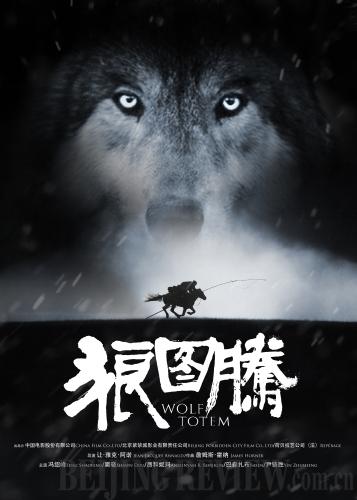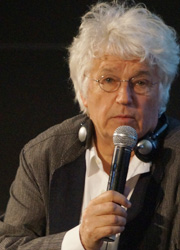 |
|
A poster for Wolf Totem (FILE) |
 |
|
Jean-Jacques Annaud |
Back in 2008, French director Jean-Jacques Annaud returned to his home in France after wrapping up shooting in the Sahara. There, from a large number of books his friends had mailed to him, Annaud picked up
Wolf Totem, a novel by a Chinese author, and was immediately drawn in. Soon after, Annaud unexpectedly received a phone call from China inviting him to direct a film adapted from the novel. Though at the same time he was also among the candidates for the big-budget Hollywood production
Life of Pi, Annaud, who is known for making films with animals such as
The Bear (1988) and
Two Brothers (2004), decided to take up the offer from China.
After almost six years of shooting and production, Wolf Totem started to be screened throughout China on February 19, the Spring Festival of this year. Generally, the weeklong Spring Festival holiday is the most lucrative box-office period of the year in China when movie-going peaks. French cinemas will release the film on April 25.
A hit book
The Chinese version of Wolf Totem, authored by Jiang Rong (penname) and first published in 2004, had been reprinted more than 150 times and had sold more than 5 million copies by the end of 2014. It has remained in China's top 10 bestselling novels for almost all of the past decade. Currently, the book is available in more than 110 countries and regions in 39 languages.
The bulk of the Wolf Totem story took place in the late 1960s in natural grassland of north China's Inner Mongolia Autonomous Region, where local Mongolian herdsmen had to fight against wolves with every means available to prevent the fierce animals from preying on their livestock. Chen Zhen, the hero of the novel, was a young man from Beijing who volunteered to live and work in the grassland as an educated youth. In order to learn the wolf's behavior, Chen and his young friends caught a group of wolf cubs and raised one as a pet. In the process, he found that the wolf is an untamable and mysterious creature. Furthermore, he was astonished by the fact that Mongolian people regard the wolf as a spiritually important animal.
However, owing to poorly thought-out government policies, massive land reclamation in the grassland led to mass slaughtering of wolves. The shortsighted move severely damaged the local eco-system, resulting in rodent infestations and desertification in the following years. At the end of the novel, sandstorms from the Mongolia Plateau blanket Beijing and even affect Japan and South Korea across the sea.
In 2007, Jiang won the inaugural Man Asian Literary Prize—renamed the Asian Literary Prize in 2012—for Wolf Totem. Adrienne Clarkson, chair of the judges for the prize, praised Wolf Totem as a panoramic novel of life on the Mongolian grasslands. "This masterful work is also a passionate argument about the complex interrelationship between nomads and settlers, animals and human beings, nature and culture," she said. "The slowly developing narrative is rendered in vivid detail and has a powerful cumulative effect. A book like no other. Memorable."
Zhang Qiang, then General Manager of Beijing Forbidden City Film Co., bought the five-year motion picture rights to the novel in 2004. Unfortunately, all Chinese directors Zhang had contacted refused his invitation to adapt the book for the silver screen, as they felt it couldn't be done. Before the first contract expired, Zhang, still unwilling to give up, renewed it for another five years with a large sum of money. Finally, he contacted Annaud and entered into cooperation with the French director, who later revealed that he has had a keen curiosity in China since his childhood and has always been interested in grassland culture.
Annaud said that he became fascinated with the novel after just a few pages. He feels he shares similar life experiences and environmental protection ideas with the author. With maintaining man-nature harmony as his lifelong principle, Annaud said that he learned how to achieve it during his days in Africa years ago.
